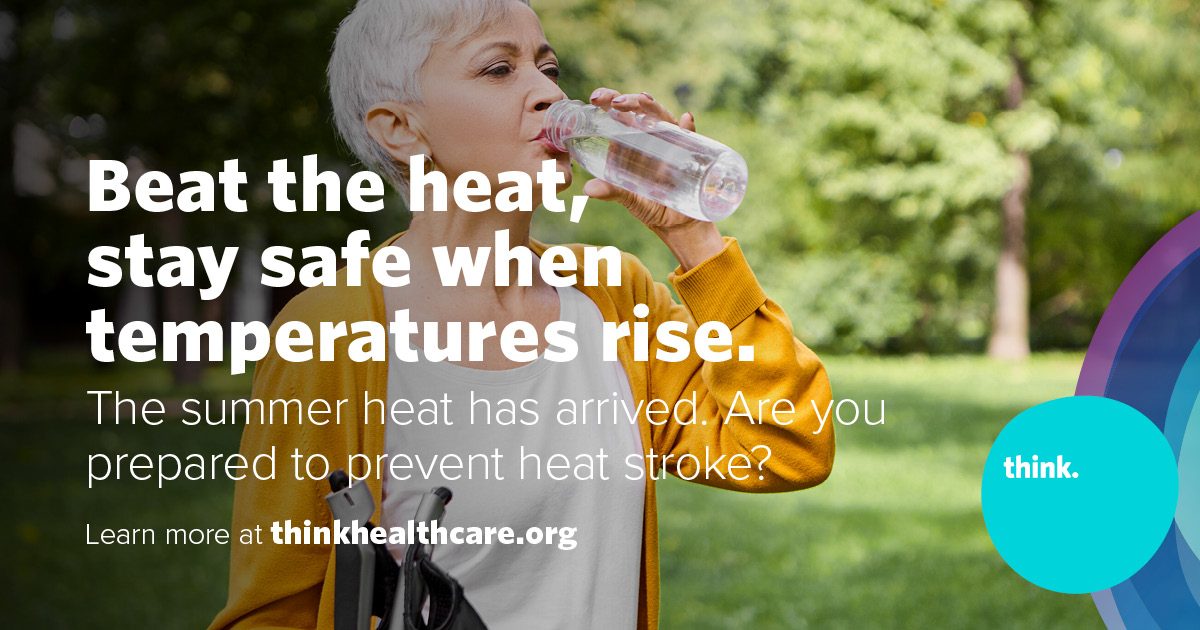Beat the heat, stay safe when temperatures rise.
The summer heat has arrived. Are you prepared to prevent heat stroke?
Summer’s warm sun and longer days are a welcome change, but with the sizzling temperatures comes an increased risk of heat-related illnesses. According to the Centers for Disease Control and Prevention (CDC), extreme heat is one of the leading causes of weather-related fatalities in the United States, claiming an average of 658 lives annually.
While high temperatures are a concern, humidity plays a significant role as well. The combination of scorching temperatures and humidity creates a double whammy effect, making it harder for the body to cool itself down. Heat exhaustion and heat stroke are two of the most serious conditions associated with excessive heat exposure.
Recognizing the Signs of Heat Illness
Heat exhaustion occurs when the body loses an excessive amount of fluids and electrolytes, often through heavy sweating during hot weather.
Warning signs of heat exhaustion include:
- Headache
- Nausea or vomiting
- Dizziness or fainting
- Muscle cramps
- Weakness or fatigue
- Heavy sweating
- Increased body temperature
- Excessive thirst
- Irritability
- Decreased urination
Heat stroke is a more severe condition that develops when the body can no longer regulate its own rapidly rising temperature. Sweating, the body’s natural cooling mechanism, shuts down, causing the body temperature to soar to dangerous levels. With heat stroke, a person’s body temperature can reach 106°F (41.1°C) or higher within minutes. Without immediate medical attention, heat stroke can lead to permanent brain damage, organ failure, or even death.
Symptoms of heat stroke include:
- Hot, red, dry skin (no sweating)
- High body temperature (above 103°F or 39.4°C)
- Rapid pulse
- Confusion or altered mental state
- Slurred speech
- Loss of consciousness
- Seizures
Taking Action When Someone Shows Signs of Heat Illness
If you suspect someone is experiencing heat stroke, take these immediate steps:
- Call 911 for emergency medical assistance.
- Move the person to a cooler, shaded area and remove any unnecessary clothing.
- Increase air circulation around the overheated individual.
- Cool the person down by applying cool water or an ice bath, wetting their skin, or placing wet cloths on their head, neck, armpits, and groin. You can also soak their clothes in cool water.
For suspected heat exhaustion, follow these first-aid measures:
- Transport the person to a ThinkQuick Walk-In Clinic or an emergency room as soon as possible. If transportation is unavailable, call 911 immediately.
- Move the person to a cooler, shaded area.
- Remove excess clothing, socks, and shoes.
- Encourage the person to sip cool water frequently.
- Apply cold compresses to their skin, particularly the face, head, and neck. Alternatively, help them cool their face, head, and neck with cool water.
Who’s Most at Risk?
Young children and adults over 65 are especially vulnerable to the dangers of excessive heat. Individuals with pre-existing health conditions like high blood pressure, diabetes, heart disease, or obesity are also at higher risk. Participating in strenuous physical activity in hot weather, consuming alcohol, or taking medications that affect body temperature or sweating can also increase the risk of heat-related illness.
Preventive Measures to Stay Cool
Be aware of your risk factors and those of your loved ones. Are there any underlying health conditions that could be worsened by high heat and humidity? If you don’t have air conditioning, consider using other cooling methods like a swamp cooler or fans. During heat waves, encourage those without air conditioning to spend time in cooler public spaces.
Here are some additional proactive tips to stay cool:
- Wear loose-fitting, lightweight clothing and a hat when outdoors.
- Schedule outdoor activities and exercise for the cooler parts of the day.
- Drink plenty of non-alcoholic fluids throughout the day, and provide extra fresh water for pets.
- Never leave children or pets unattended in a car, even for a short errand.
- Check on elderly, disabled, or homebound individuals during heat waves.
ThinkQuick Walk-In Clinic is Here to Help.
Our team at ThinkQuick Walk-In Clinic is available every day of the week to treat minor illnesses and acute injuries, including heat-related illnesses. We encourage you to learn more about underlying health conditions that can increase your risk of heat-related illness in hot weather.
Think Whole Person Healthcare is committed to providing comprehensive, high-quality care at affordable costs. Call 402-506-9049 to schedule an appointment today or book online with your primary care physician. Think Whole Person Healthcare offers convenient same-day appointments in our central Omaha location.
